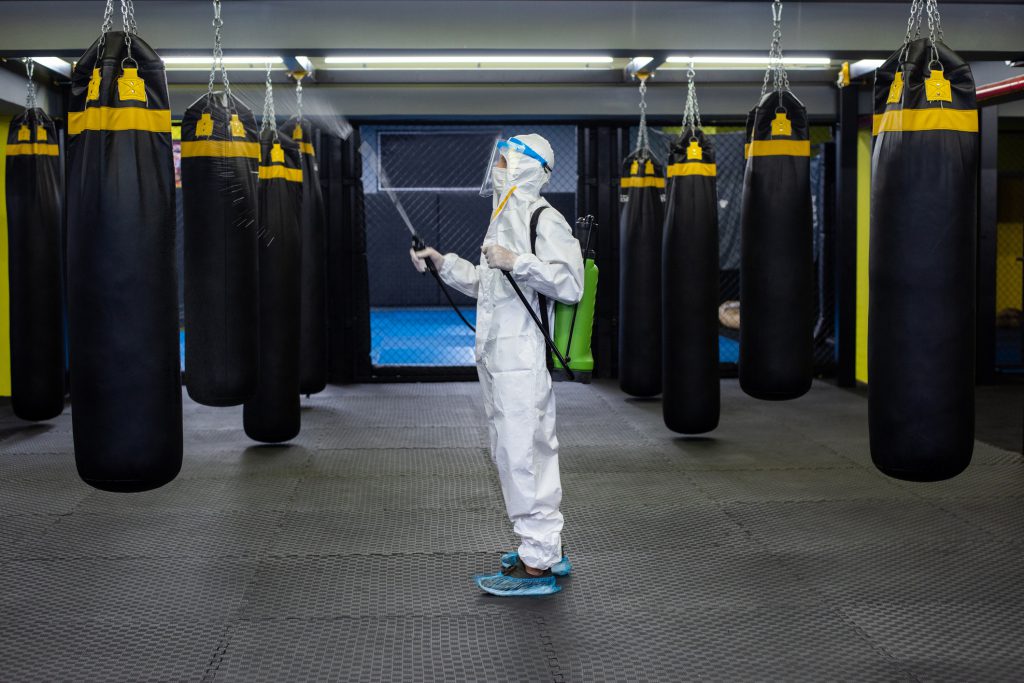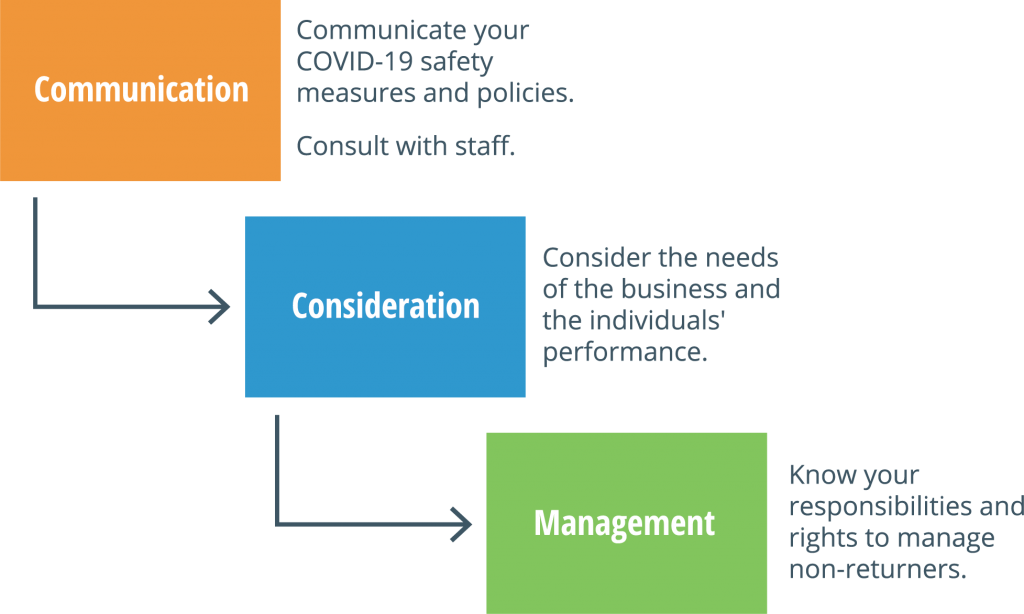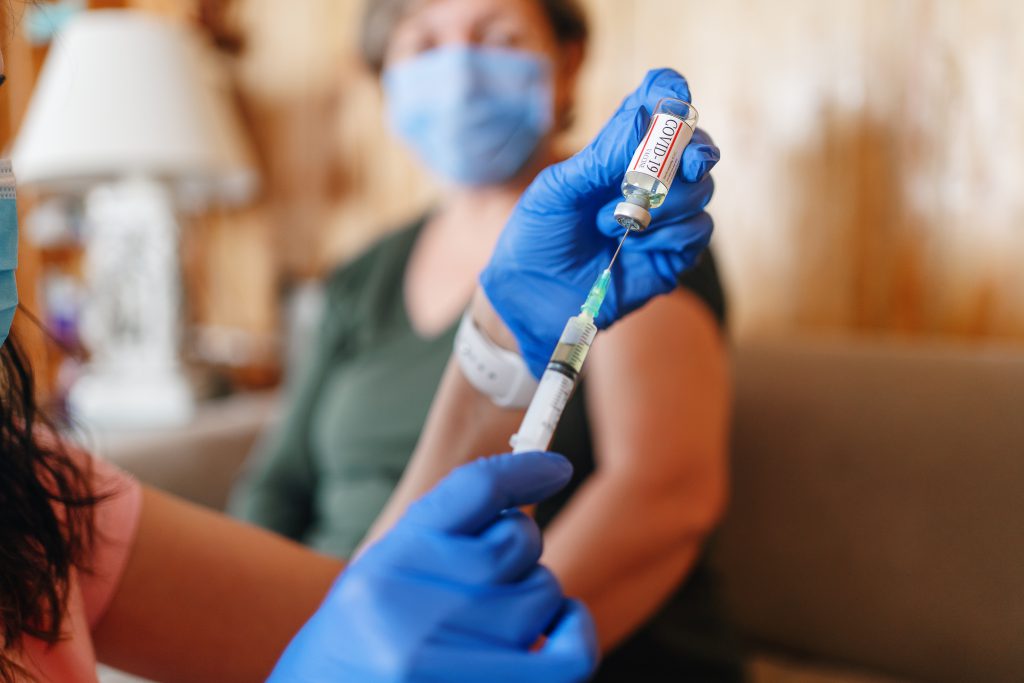Navigating through COVID-19 requirements is a challenge for all businesses to ensure compliance.
What businesses need to do
- Learn how to approach your workforce about their vaccination status.
- Minimise risk of discrimination or other procedural fairness issues.
- Ensure your business is compliant with government directions, occupational health and safety obligations and workplace laws.
- Learn what to do if staff refuse to get vaccinated, and when you need to seek legal advice.
Check list: Managing the impact of COVID-19 on your business
We have a range of tools available to support WA Businesses.
- Conduct a Risk Assessment
- Access letter templates to communicate and manage vaccination requirements with employees.
- Conduct a Business Continuity Assessment.
- If in doubt, contact our Employee Relations Advice Centre or our Legal Team.
- COVID-19 Additional Resources and Webinars.
Frequently asked questions
Updated October 3, 2022
CCIWA Members with questions or concerns can contact our Employee Relations Advice Centre on (08) 9365 7660.
Our Employee Relations Advice Centre offers advice and information targeted to our Members’ needs. The team has taken hundreds of calls on COVID-19 so far. Below you can find some general guidance to frequently asked questions.
WA Current Requirements
Isolation
From Friday, October 14, COVID-19 mandatory isolation requirements for COVID-positive patients will be removed. However, people are strongly encouraged to stay home if unwell.
Until October 14, the five-day isolation period remains.
Masks
Mask-wearing is required for people aged 12 years and older in the following high-risk settings:
- Hospitals and health care settings including GPs; Aboriginal health services; Dental and optical health clinics; and Allied health services such as physiotherapy, radiology and occupational therapy services
- Aged care facilities, residential care facilities including disability service facilities and mental health residential facilities
- Correctional facilities
Mask use is recommended in indoor settings for cases and close contacts for two days after completion of isolation (Days 6 and 7).
The usual exemptions from mask requirements apply.
Hospitals
Visitors to hospitals are limited to the following:
Essential visitors
- An ‘essential visitor’ includes someone who is:
- a parent or guardian of a child
- a parent or guardian of a person with complex needs or a person with a disability
- a carer
- a birthing partner
- otherwise present for compassionate or other reasons approved by the hospital.
Other visitors
- Non-essential visitors are limited to two people per patient per day during visitor hours and are in addition to an essential visitor.
Surgical masks need to be worn by visitors, parents/carers and/or statutory personnel aged 12 years and over.
People with symptoms are not permitted to enter public hospitals, but exceptions may be made on compassionate grounds.
Visitors with no symptoms only have to show a negative Rapid Antigen Test (RAT) if they are visiting vulnerable patients.
All visitors to hospitals may be required to show proof of vaccination and wear a mask (unless an exception applies).
Residential aged and disability care facilities
Individual facilities can determine the number of visitors permitted per resident each day.
Masks must be worn by staff and visitors, inside and outdoors (unless an exception applies).
Proof of vaccination is required to enter residential aged care facilities but not for residential disability care facilities.
For more see www.wa.gov.au.
For further guidance, call CCIWA’s Employee Relations Advice Centre on 9365 7660 or email [email protected].
Showing proof of vaccination is no longer required when entering venues and businesses.
It is still required to visit residential aged care facilities and may be required when visiting hospitals.
Find out more about getting proof of your COVID-19 vaccinations
It is no longer a requirement for people to check-in to any business or premises other than where proof of vaccination is still required (hospitals and aged care facilities).
COVID Safety Plans and Guidelines and COVID Event Plans, Checklists and Guidelines help ensure businesses actively mitigate the risks of COVID-19 and reduce its potential risk and spread.
All businesses in WA, regardless of size, are encouraged to update their COVID Safety Plan if they are required to have one, or develop a COVID Safety Plan if they do not have one, to protect staff and patrons from COVID-19.
For more see CCIWA’s COVID-19 Safety Package.
Both interstate and international travel into WA is permitted.
From September 9, 2022, masks are no longer required on flights travelling to Australia. From July 6, 2022:
- People entering Australia do not need to provide evidence of vaccination status
- People entering Australia do not need to complete the Digital Passenger Declaration or Maritime Travel Declaration
- People leaving Australia will not be asked to provide evidence of their vaccination status
- Unvaccinated visa holders do not need a travel exemption to travel to Australia.
Airlines, vessel operators and other countries may have specific requirements that travellers need to comply with.
The Australian Government is responsible for Australia’s international border.
For more information, visit the Department of Home Affairs’ website.
Mandatory Vaccinations and Employees
As of June 10, WA’s mandatory vaccination policy will only apply to workforces working with the most vulnerable to protect them from severe disease.
This means workers in the following sectors must be triple dose vaccinated to be able to enter to their workplace:
- Healthcare and health support workers in hospitals and primary health care settings;
- Workers in residential aged care; and,
- Workers in residential disability settings.
For workplaces where mandatory vaccination still applies, individual employees could be fined up to $20,000 if they aren’t vaccinated. You could be fined up to $100,000 if you are found to have employees, including yourself, who aren’t vaccinated.
For workplaces with mandatory vaccination, employers are required to ensure unvaccinated staff do not enter the workplace or undertake certain roles.
Employers can choose to issue employer directions, should you choose to do so, from which you may be able to take other action.
We recommend you consider the likelihood of employees refusing vaccination and the process you will take to respond to this, including discrimination considerations and assessing the potential impact on an employee’s ability to carry out the key requirements of their role.
In general, we recommend you consider adopting a COVID-19 vaccination policy that acknowledges specific exemptions from vaccinations and sets out evidence requirements (e.g. employees claiming medical conditions may need to provide a medical certificate supporting this claim). In all communications regarding the vaccination policy, employers should also make sure to clearly outline any potential consequences of workers refusing to comply with the policy and/or public health
orders.
Find out more in our free COVID-19 Vaccinations and the Workplace Employer Guide.
Even if your business isn’t subject to mandatory vaccines, it’s likely that customers and suppliers may require your workforce to be vaccinated as a condition of engagement or entry.
CCIWA has consistently urged WA businesses to support staff to participate in the vaccination effort. This is the only way to get past the era of lockdowns and travel restrictions, and back to life and business as usual.
For workplaces with mandatory vaccination, employers are required to ensure unvaccinated staff do not enter the workplace or undertake certain roles.
Employers can choose to issue employer directions, should you choose to do so, from which you may be able to take other action.
We recommend you consider the likelihood of employees refusing vaccination and the process you will take to respond to this, including discrimination considerations and assessing the potential impact on an employee’s ability to carry out the key requirements of their role.
In general, we recommend you consider adopting a COVID-19 vaccination policy that acknowledges specific exemptions from vaccinations and sets out evidence requirements (e.g. employees claiming medical conditions may need to provide a medical certificate supporting this claim). In all communications regarding the vaccination policy, employers should also make sure to clearly outline any potential consequences of workers refusing to comply with the policy and/or public health
orders.
Find out more in our free COVID-19 Vaccinations and the Workplace Employer Guide.
Ensure you understand and comply with all public health orders to avoid facing penalties.
COVID and the workplace
If a staff member tests positive for COVID-19 and was infectious in the workplace, the affected employee will need to follow testing and isolation protocols.
If you or any of your employees use a Rapid Antigen Test (RAT), positive results must be registered through the Department of Health’s online portal. Information is available about the Mandatory registration of positive Rapid Antigen Tests.
If an employee is required to care for their children who are directed to isolate as per the close contact protocols, they will be entitled to take annual leave in the first instance. If their child subsequently contracts COVID-19, the employee is then able to take carer’s leave for the duration of the illness of their child.
If your employee has been absent from work due to COVID-19 or another illness, provided the request is reasonable in the circumstances, you may be able to request reasonable evidence to confirm they are now fit to return to work. Evidence may include confirmation from the relevant government authorities. If you are unsure as to whether the evidence that has been provided to you is suitable, it is recommended you contact the COVID hotline on 13 26843.
An employee has been deemed a close contact and needs to isolate. Are we still required to pay them?
If an employee is a close contact, is directed to isolate and they are unable to work from home, they will be required to use paid entitlements (such as annual leave or long service leave) or unpaid leave during their period of isolation. If the employee is able to work from home during their isolation period, the employer will be required to pay them for the ordinary hours worked.
No. An employee is only entitled to use their paid personal/carer’s leave entitlement in the event the employee contracts COVID-19 or suffers another illness. Where the employee does not have any paid personal/carer’s leave, they may take unpaid leave or access other paid leave entitlements (such as annual leave or long service leave). Members covered by a modern award should check whether their employees are entitled to unpaid pandemic leave.
Where an employee is directed to isolate due to COVID-19, they may be entitled to the Pandemic Leave Disaster Payment – Western Australia. Services Australia will determine whether or not and employee is eligible for the payment. For more information visit Services Australia via https://www.servicesaustralia.gov.au/pandemic-leave-disaster-payment. Employees may also be eligible for the State Government COVID-19 Test Isolation Payment, for more information https://www.wa.gov.au/government/announcements/covid-19-test-isolation-payment-be-introduced.
Featured content

Managing COVID-19 in the workplace — know the rules
It’s likely that you have staff affected by COVID-19. Understanding the next steps is critical to maintaining operations.

Managing post-COVID work arrangements
Transitioning workers back to the office after weeks, or months, of working from home can pose challenges. But there are ways to help manage staff reluctant to resume work, and create a positive post-COVID workplace culture.

Implementing a COVID-19 vaccination policy
The COVID-19 vaccine will be mandatory for the majority of WA’s workforce. To ensure your business is compliant, the best place to start is a…
CCIWA can help

Employee Relations Advice Centre
We can help Members identify policy and procedural responses within legislative frameworks.

Workplace Relations Consulting
We can assist with managing and restructuring your workforce during periods of uncertainty.

International Trade Consulting
Support your business continuity with advice about alternative suppliers and export markets.
CCIWA supporting our regional chamber members

As the peak body representing businesses in WA for more than 125 years, we support and connect thousands of businesses with one vision in mind: for WA to be the best place to live and do business.
Our regional Members have access to a range of CCIWA member benefits and services. For assistance with your CCIWA Regional Membership, please contact our Membership Experience Team on 1300 422 492 or email [email protected].
Click on our interactive map to explore our regional chambers, or learn more about how the different regions are faring through COVID-19 in our recent edition of Regional Pulse.
Expert advice if you need it
CCIWA Members with questions or concerns can contact our Employee Relations Advice Centre on (08) 9365 7660 or via [email protected]. Alternatively you can request a call back from our Employee Relations Advice Centre or Legal Teams using the following form.




